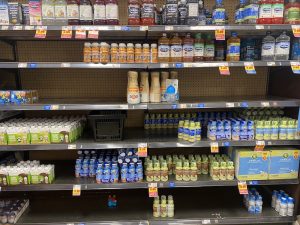Over the past six years, the top 25 American food companies have lost $18 billion in market share, according to Fortune Magazine.
Susan Schwallie, a market research expert with the NDP Group, says one reason is that American consumers are increasingly shifting their dollars to organic products.
Schwallie talked about organics’ growing influence at Camp Bacon, a seminar on specialty foods (especially bacon) put on by Zingerman’s in Dexter, Mich., earlier this month.
Here’s what she had to say about the growing influence of “clean food.”
Higher income families with kids are the most likely to eat organics.
In 2014, families that earned $71,000 or up ate organics 97 times, her data showed.
That compared with 53 times for all households, and 53 times for households with kids where the income level was below $71,000.
Restaurant meals are plummeting.
Americans have cut back on restaurant meals. The number of meals eaten out peaked in 2000, at 215, Schwallie says. (That’s out of a possible 1,095 meals, if you consider three meals a day.) Now, Americans eat 191 meals out per year.
Fast food is bearing the brunt.
We’ve written a lot about the problems McDonald’s is having and Schwallie is blunt about its troubles. “They are on the ropes,” she says. That’s reflected in the drop in dollars spent by millennials on eating out.
Younger consumers spent $1,240 on dining out in 2014, down $146 from the year before. Millennials represent 23 percent of all meals eaten out.By contrast, older diners spent $1,369 on dining out last year, which was down $213, but is still more than millennials spend.
Food companies are snapping up organic brands.
General Mills recently bought Annie’s Organic Foods, while Hormel now ownes Applegate Farms. Schwallie notes that organic products are being featured by everyone from Target to Walmart to Aldi’s, whose parent company owns Trader Joe’s.
Organics mean healthy to many people, and in our next story, we’ll look at how “good for you” foods are showing up in more lunch bags.
Schwallie’s findings make great story ideas. Visit your local supermarket chain, and see what kind of visibility it is giving organic products. Have any of your local producers been purchased by bigger companies? You also might talk to all ages of shoppers at your farmer’s market, and see how often they cook versus eating out these days.










